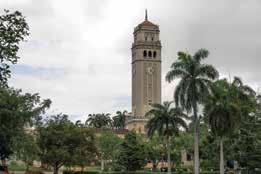
9 minute read
How Discrimination Harms Latinos in the Labor Market and Targeted Policies Can Dramatically Help
WASHINGTON, DC | CENTER FOR AMERICAN PROGRESS | October 21, 2020 — A new issue brief from the Center for American Progress concludes that exogenous factors rather than personal choices are the reason why the Latino employment rate lags behind that of non-Hispanic white workers. Since 1976, when the U.S. Bureau of Labor Statistics first started tracking employment data by ethnicity, the Latino unemployment rate has generally remained between 1.6 and 1.9 times higher than the non-Hispanic white unemployment rate, and it has never dropped below a ratio of 1.2. The brief finds that education, often touted as a great equalizer, does not protect Latinos from unemployment. In fact, Latinos face worse employment outcomes relative to their non-Hispanic white peers as they become more educated. Since 2000, the average annual prime-age unemployment rate for Latinos without a high school diploma was 4 percentage points lower than that for their white counterparts. But the annual prime-age unemployment rate for Latinos with at least a bachelor’s degree was actually 1.4 percentage points higher than that of their white counterparts over the same time period. The brief also finds that occupational segregation has led to a situation in the United States in which Latinos disproportionately work in industries that are seasonal or susceptible to economic shocks, such as construction, food services, and agriculture. Also, a high percentage of Latino workers are foreign born, and evidence suggests that immigrant populations’ employment status is often more closely tied to to the business cycle than the employment status of nonimmigrants. Additionally, nine of the 10 metropolitan statistical areas in the United States with the highest unemployment rates prior to the COVID-19 recession were majority Latino. The brief also finds that when Latinos are employed, they are often paid far less than their non-Hispanic white counterparts. The ratio of the prime-age median wage income between the latter and the former group has remained virtually unchanged since 2000, fluctuating between 1.6 and 1.5. The brief recommends policy solutions that could help Latinos in the labor market and help to close the gap. They include: WASHINGTON, DC | CENTER FOR AMERICAN PROGRESS | October 23, 2020 - Due to the coronavirus-induced recession and budget cuts by the Trump administration, millions of government jobs in the U.S. Postal Service and state and local governments are in danger of disappearing. A new issue brief from the Center for American Progress and the National Advisory Council on Eliminating the Black-White Wealth Gap finds that the disappearance of these jobs would disproportionately hurt Black workers at the same time that Black Americans are facing disproportionately bad economic and health outcomes from the coronavirus crisis. Today, nearly 1 in 5 Black workers are employed in the public sector. The legacy of Black government workers is particularly strong in the Postal Service, where 27 percent of postal workers are Black—more than double the share of Black workers in the civilian workforce. And while the numbers of Black employees in state and local governments are harder to measure, they are a substantial portion of the workforce in states and municipalities around the country. Decades of organizing by Black people in the labor movement have made public sector work a way for Black workers to build personal economic security through better wages, benefits, and job security than are often available in the private sector while serving their communities. While public sector work cannot solve structural racism or close the Black-white wealth gap, the gap in the public sector is much smaller. For example, in the private sector, white households have as much as $10 of wealth for every $1 Black households hold; in the public sector, white households hold closer to • Improving programs to counter labor market volatility, such as unemployment insurance, work sharing programs, and wage subsidies • Granting undocumented and noncitizen workers a pathway to legalization and citizenship and allowing them to access social insurance programs • Instituting paid sick and family medical leave policies • Improving Latino education outcomes and making higher education more affordable for Latinos Still, the brief notes that “there is only so much that these targeted policies can do to increase Latino labor force participation and ease the transition period between jobs when so many of those making hiring and firing decisions hold discriminatory views against Latinos.” Surveys show that a substantial number of Latinos have been personally discriminated against when applying for jobs or when considered for raises or promotions. “Both the coronavirus itself and the recession it generated disproportionately harmed Latinos,” said Ryan Zamarripa, associate director of Economic Policy at CAP and author of the brief. “At the same time, the crisis marks an opportunity to rebuild the economy in a way that prioritizes equity. Latinos represent an ever-increasing share of the labor force and disproportionately work in essential roles. They are too important to ignore.” Read the issue brief: “Closing Latino Labor Market Gap Requires Targeted Policies To End Discrimination” by Ryan Zamarripa
The Center for American Progress is an independent nonpartisan policy institute that is dedicated to improving the lives of all Americans, through bold, progressive ideas, as well as strong leadership and concerted action. Our aim is not just to change the conversation, but to
Advertisement
change the country $2 for every $1 of wealth for Black families. At the same time, the Trump administration’s cuts to the Postal Service and budget cuts by state and local governments threaten this path to stability for Black workers. Over the past six months, 1.2 million state and local government jobs have disappeared. Data show there were 211,000 fewer Black workers working for governments in September 2020 than in September 2019. “As policymakers from school board members to the Federal Reserve chairman look for ways to address structural racism, it’s important they not undermine one of the few long-standing paths to financial stability for Black workers: government jobs,” said Anne Price, president of the Insight Center for Community Economic Development and co-author of the brief. “Without significant action from the federal government to address the budget shortfalls in both the Postal Service and state and local governments, the economic security of millions of Black Americans may be in danger for the second time in a decade.” Read the issue brief: “Public Work Provides Economic Security for Black Families and Communities” by Michael Madowitz, Anne Price, and Christian E. Weller
The Center for American Progress is an independent nonpartisan policy institute that is dedicated to improving the lives of all Americans, through bold, progressive ideas, as well as strong leadership and concerted action. Our aim is not just to change the conversation, but to change the country.


Agrarian Puerto Rico: Reconsidering Rural Economy and Society, 1899–1940
by CÉSAR AYALA & LAIRD W. BERGAD • Cambridge, England | CAMBRIDGE UNIVERSITY PRESS | March 2020 | 322 pages Description: Fundamental tenets of colonial historiography are challenged among them: American Sugar Kingdom: the by showing that US capital investment into this colony did not lead to the Plantation Economy of the Spanish Caribbean, disappearance of the small farmer. Contrary to well-established narratives, 1898-1934 (Chapel Hill: University of North quantitative data show that the increasing integration of rural producers Carolina Press, 1999); Puerto Rico in the American within the US market led to differential outcomes, depending on pre-existing Century: A History Since 1898 (Chapel Hill: University land tenure structures, capital requirements to initiate production, and of North Carolina Press, 2007); Puerto Rico en el demographics. These new data suggest that the colonial economy was not siglo norteamericano: su historia desde 1898 polarized into landless Puerto Rican rural workers on one side and corporate [Translation of Puerto Rico in the American US capitalists on the other. Century: A History Since 1898 by Aurora The persistence of Puerto Rican small farmers in some regions and Lauzardo] (San Juan: Ediciones Callejón, 2011), the expansion of local property ownership and production disprove this coauthored with Rafael Bernabe, and; Battleship Vieques: Puerto Rico socioeconomic model. Other aspects of extant Puerto Rican historiography from World War II to the Korean War (Princeton: Markus Wiener Publishers, are confronted in order to make room for thorough analyses and new 2011), coauthored with José Bolívar. conclusions on the economy of colonial Puerto Rico during the early LAIRD W. BERGAD is a Distinguished Professor in the Department of Latin twentieth century. American and Latino Studies at Lehman College and the Graduate Center, and Reviews: is the founding and current director of the Center for Latin American, Caribbean ‘Ayala and Bergad provide an original reading of twentieth-century Puerto and Latino Studies at the Graduate Center, City University of New York. Rican history based on a detailed analysis of extensive local tax and census Bergad has written and published six previous books about rural slave-based records to 1940. They show that the US colonial government did not carry societies during the eighteenth and nineteenth centuries in Puerto Rico, Cuba, out a restructuring of land tenure in favor of US capitalists, which is the and Brazil, and Latinos in the U.S.: Coffee and the Growth of Agrarian traditional argument, but maintained both the pre-conquest landowners and Capitalism in Nineteenth-Century Puerto Rico (Princeton University Press, the land and labor system, which existed under Spain. Their reconstruction 1983); Cuban Rural Society in the Nineteenth Century (Princeton University also provides an excellent social and economic history of the island in this Press, 1990); The Cuban Slave Market, 1790-1880 (co-authored with Fe period. This work will have a major impact on interpreting both Puerto Rican Iglesias Garcia and María Carmen Barcia), (Cambridge University history and the evolution of the American empire in the twentieth-century.’ (Herbert S. Klein - Gouverneur Morris Professor Emeritus of History, Press,1995); Slavery and the Demographic and Economic History of Minas Gerais, Brazil, 1720 – 1880 (Cambridge University Press, 1999); Hispanics Columbia University) in the United States, 1980 - 2005 (Cambridge University Press, 2010) ‘This riveting study of Puerto Rico’s rural economy and society in the early (co-authored with Herbert S. Klein). 1900s upends the widely-accepted belief that US colonialism and sugar companies led to the concentration of land and the dispossession of rural Puerto Ricans’ landholdings. Instead, through a painstaking and careful examination of data, the authors show that most land-owning patterns established during Spanish colonial rule continued through the 1930s.’ (Margaret Power - Professor of History, Illinois Institute of Technology) ‘With this work, Ayala and Bergad culminate long years of study on the agrarian history of Puerto Rico. The authors provides a solid foundation using the analysis of a large database of fiscal data and other sources, as well as through the performance review of the main branches of commercial Saturdays 10 AM Domingo 7 PM agriculture. The reader will find in these pages an explanation so well argued of a crucial process in Puerto Rican history.’ WHMP radio (Oscar Zanetti - Professor, University of Havana) ‘Agrarian Puerto Rico will unsettle the historiographical landscape, debunking 1400 AM predominant narratives and shifting the terms of scholarly discussion. Its unique examination of the interconnected histories of sugar, coffee, and tobacco is unprecedented and refreshing. With a nuanced inward look at Puerto Rico’s complex rural economy, the book is well balanced with an biingüe arte, cultura, media politics outward Hispanic Caribbean perspective.’(Jorge L. Giovannetti-Torres - author of Black British Migrants in Cuba) Natalia Muñoz
About the Authors:
CÉSAR AYALA is a Professor of Sociology at the University of California, Los Angeles, where he teaches Comparative Historical Sociology, Economy and Society, and Sociology of Latin America and the Caribbean. He earned his Ph.D. in Sociology from SUNY- Binghamton in 1991. Ayala is the author of numerous publications on Puerto Rican history,


